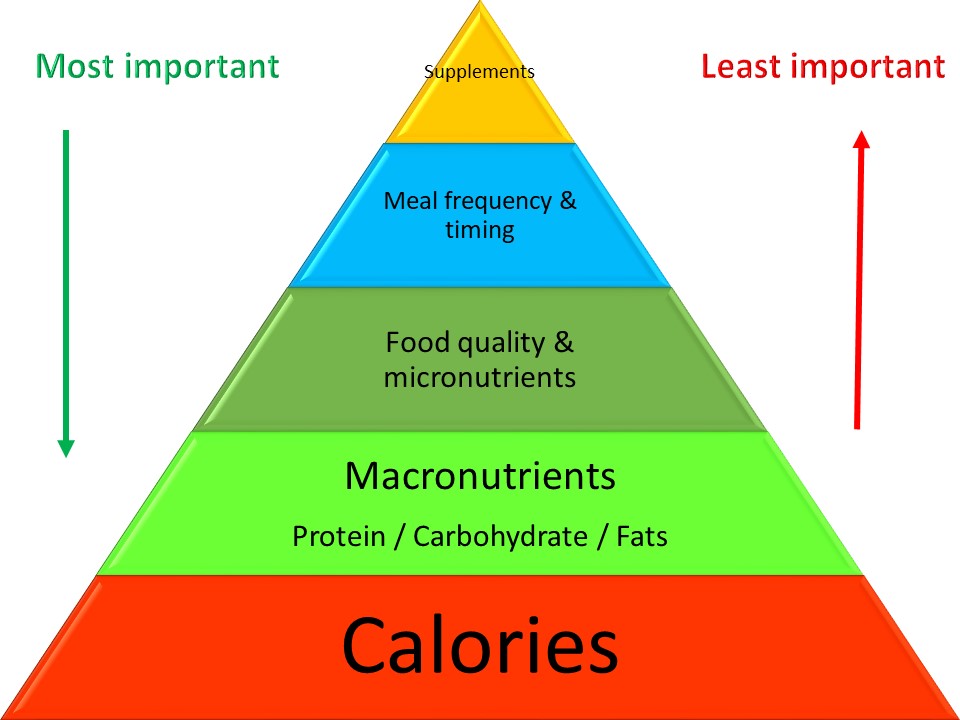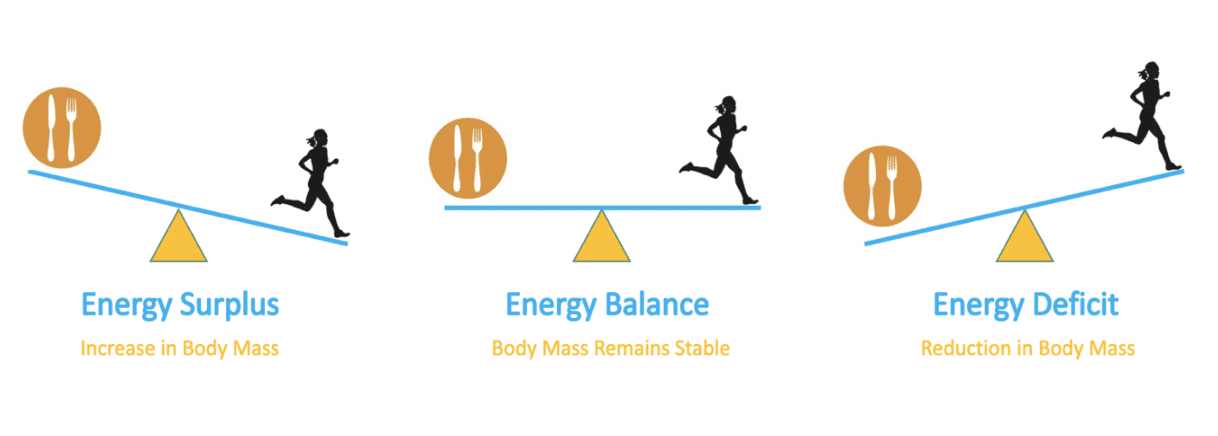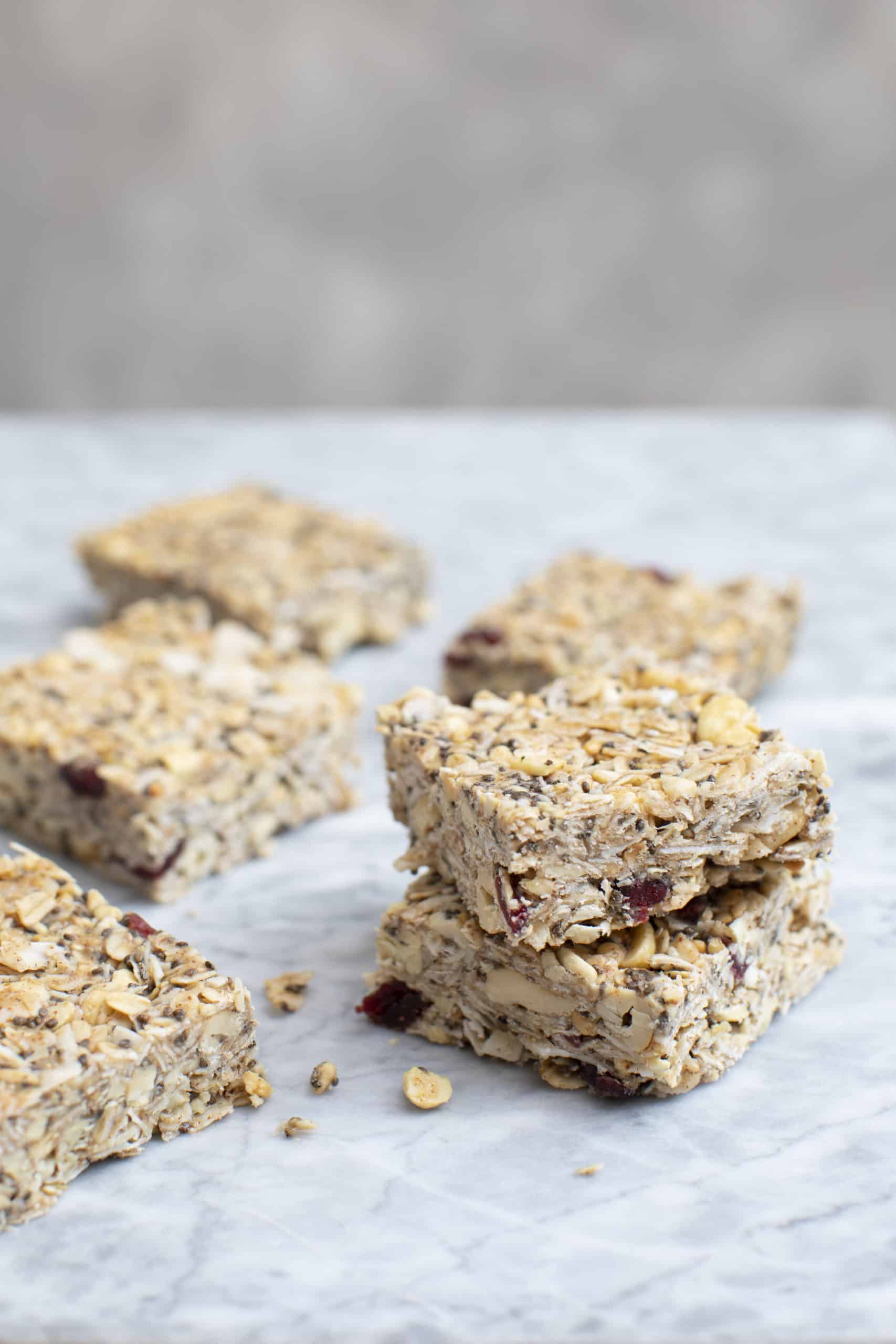We all need a plan when it comes to achieving our goals, this framework can be used to assess your nutrition on a daily or weekly basis to keep you on track and understand what to prioritise.
Summary points
- Calories or energy which is specifically suited to our personal needs is critical to optimally complete daily tasks and achieve various health or performance goals.
- Macronutrients which are protein, carbohydrate and fat are our primary sources of energy from food. Meeting our personal needs for each one of these nutrients is critical for health, energy, body composition goals and of course, athletic performance.
- Food composition relates to the nutrient density of the foods we eat day to day. Vitamins, minerals and antioxidants play a critical role in health, wellbeing and performance.
- Food timing relates to when food is consumed, at a high level this means at what point in the day you have your meals and in a performance context it is specific to when food is consumed before or after exercise.
- Supplements are often what people want to discuss first when considering their dietary goals. While in specific cases supplements can offer an important solution for meeting the need for certain nutrients, the topic of supplements is the least important factor when it comes to the success of your diet.

Getting the essentials nailed down!
Nutrition is an ever – evolving science that even the most well – educated and qualified scientists, dietitians and nutritionists are still learning about. What is known and cannot be debated is that nutrition has an immeasurable influence on health, wellbeing and the risk for many diseases. The greater control you have on your eating and lifestyle habits the better you feel, the better you look and healthier you will be. While there is much we don’t know there is thankfully some sound nutrition principles that we do know. For example, there is a hierarchy of nutrition needs that every person can follow to determine their individual nutrition needs for health or performance. This is the hierarchy or framework for determining the most important aspects of nutrition for a person and it can prove invaluable when goal setting for health and performance.
Calories / Energy for health and wellbeing
Energy requirements for people will vary depending on gender, body weight, body composition, level of physical activity, dietary choices and health or performance goals. Calories do of course matter and eating too many calories, even from unprocessed nutritious food, will lead to weight gain or fat storage. However, eating mostly fresh and unprocessed foods combined with regular physical activity will allow you to remain at a suitable, healthy bodyweight. Consistent over-consumption of calories leading to increased weight and adiposity is strongly correlated with an increased risk of developing lifestyle – related diseases like cardiovascular disease, type 2 diabetes and cancer. On the other hand, low energy intakes can result in loss of muscle mass, an increased risk of fatigue, injury, illness, menstrual dysfunction and a prolonged recovery process. Meeting your own specific needs for calories is therefore critical and it is for this reason that we developed a highly individualised performance nutrition calculator to help people better understand their calorie and nutrient requirements.

For most people it is not essential to count calories or avoid any food groups. People who complete physical activity in line with general health guidelines (e.g., exercising 30–40 min per day, 3-5 times per week) can typically meet nutritional needs following a normal diet (e.g., 1800–2400 kcals/day or about 25–35 kcals/kg/day for a 50–80 kg person) because their caloric demands from exercise are not excessive (e.g., 200–500 kcals/session). This information is taken from ISSN exercise & sports nutrition review update: research & recommendations.
 Calories for athletes
Calories for athletes
For athletes with a specific goal in mind such as fuelling a performance phase, recovery, building lean mass or reducing body fat, it is important to understand calories to achieve performance-related goals. The primary focus for an athlete’s health, wellbeing and performance is to ensure they are consuming enough calories to offset the energy they’re expending and promote adaptation from training. Athletes participating in intense training (e.g., 1–3 h per day of intense exercise performed 5–6 times per week) may expend 600–1200 kcals or more per hour during exercise. In these circumstances, an athletes calorie needs may approach 40–70 kcals/kg/day (2000–7000 kcals/day for a 50–100 kg athlete). This information is taken from ISSN exercise & sports nutrition review update: research & recommendations. Most athletes will fall in the mid-range of calorie needs (3000-4000) – with the larger calorie intakes only needed for short, high volume training blocks or competition phases.
Macronutrients
Macronutrient is the scientific name for the three types of foods we eat – protein, carbohydrates and fats. Your main nutrition goal should be to establish a consistent and balanced eating pattern that provides your body with sufficient energy, a wide variety of micronutrients (vitamins and minerals) and essential fats and antioxidants, while drinking enough fluids. Eating a varied selection of vegetables, fruits, lean meats, fish, nuts and seeds while avoiding processed foods as much as possible will allow you to recover from your exercise sessions.
Carbohydrate and protein intake are particularly important for athletes to understand to promote adaptation and facilitate recovery. Carbohydrate is the primary fuel required by athletes completing regular bouts of high intensity exercise, and it is necessary for optimal performance during high intensity exercise and longer duration activities. If you want to learn more about the critical role protein plays in health and performance please read this article.
 Food composition – What is healthy eating?
Food composition – What is healthy eating?
With so much contradictory information in the media about what the “right” way to eat is, it can be hugely confusing for people to know what foods they should eat day to day. To make it as simple as possible “healthy eating” means eating foods that are minimally processed and rich in nutrients. Vegetables, fruits, quality meats, fish, seafood, eggs, nuts, seeds and dairy are generally unprocessed foods that should be the foundation of a healthy diet. In the most recent nutrition guidelines it is suggested that we should consume a minimum of 7 portions of vegetables and fruit for long term health and reduced risk of disease. Processed foods like crisps, biscuits, milk chocolate, pastries, sugary cereals, sweets and any other food that comes with additives, preservatives and added sugars should be minimised where possible.
Food Timing
Broadly speaking your daily aim is to align your general eating practice to your level of physical activity, meaning you eat the type and amount of food that is specific to your individual needs. If you are sitting at a desk all day, your need for energy and carbohydrate is significantly less than a person who is on their feet all day and who completes high-intensity physical activity on four or more days per week.
For pre-exercise meals, the guide is not to eat a large meal within two to three hours before your exercise session or an event. Your body needs 3-4 hours to fully digest food and you should have an empty stomach in the onset of exercise.
Post-exercise, eat within an hour of completing your session for the best recovery. If you are just doing light activity like a walk or gentle gym workout, an hour either side of the session is a reasonable amount of time to a stomach upset.
 In recent years there has been significant discussion about various forms of fasting and time restricted eating. These approaches may have been implemented for short time frames or in very individual circumstances but in most cases having your meals within 12 waking hours is a sensible and practical approach to your nutrition. For example, if you get up at 07:00 and have your breakfast at 08:00 then having your last meal by 20:00 should work well in most cases. To better understand post exercise nutrition please read this article.
In recent years there has been significant discussion about various forms of fasting and time restricted eating. These approaches may have been implemented for short time frames or in very individual circumstances but in most cases having your meals within 12 waking hours is a sensible and practical approach to your nutrition. For example, if you get up at 07:00 and have your breakfast at 08:00 then having your last meal by 20:00 should work well in most cases. To better understand post exercise nutrition please read this article.
Supplements
If you do a quick online search for nutrition or supplement aids to boost health and exercise performance, you will come across countless hits with endless claims. Unfortunately the vast majority of these supplements don’t work and are a waste of money. In terms of supplements having a direct health or performance benefit, there are a very small number of supplements that should be considered, this is only after all nutrition targets have been met by an individual. These supplements will be covered in other articles on the daveynutrition website.
 References
References
Alissa, E.M. and Ferns, G.A., 2017. Dietary fruits and vegetables and cardiovascular diseases risk. Critical Reviews in Food Science and Nutrition, 57(9), pp.1950-1962.
Maughan, R.J., Burke, L.M., Dvorak, J., Larson-Meyer, D.E., Peeling, P., Phillips, S.M., Rawson, E.S., Walsh, N.P., Garthe, I., Geyer, H. and Meeusen, R., 2018. IOC consensus statement: dietary supplements and the high-performance athlete. International journal of sport nutrition and exercise metabolism, 28(2), pp.104-125.
Oyebode, O., Gordon-Dseagu, V., Walker, A. and Mindell, J.S., 2014. Fruit and vegetable consumption and all-cause, cancer and CVD mortality: analysis of Health Survey for England data. J Epidemiol Community Health, 68(9), pp.856-862.
Thomas, D.T., Erdman, K.A. and Burke, L.M., 2016. American College of Sports Medicine Joint Position Statement. Nutrition and Athletic Performance. Medicine and science in sports and exercise, 48(3), pp.543-568.









